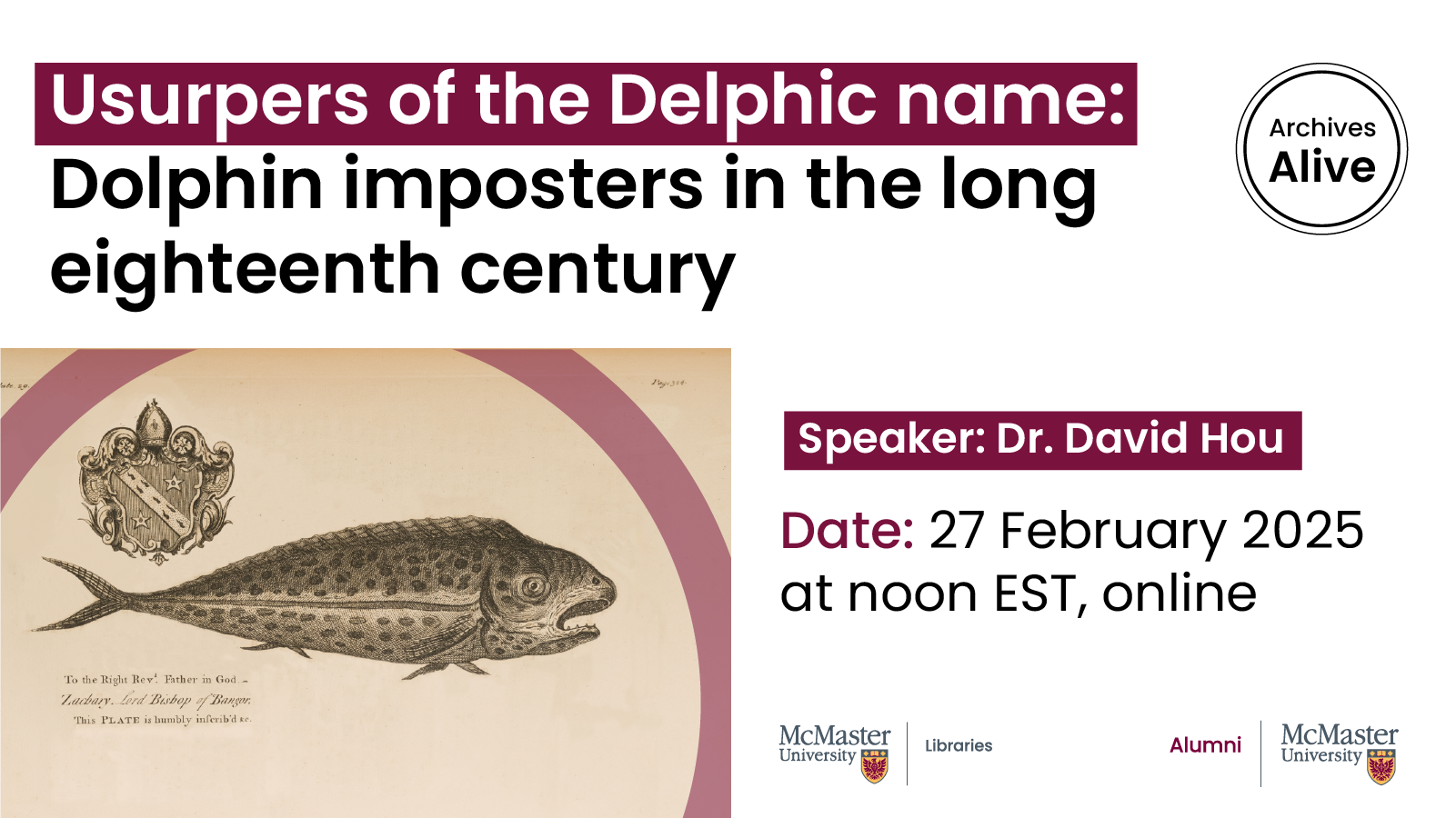
What makes a dolphin a dolphin?
This question will be explored in Usurpers of the Delphic name: Dolphin imposters in the long eighteenth century, the next session of the 2024-2025 Archives Alive series hosted by McMaster University Libraries and McMaster Alumni.
Presented by David Hou and moderated by Peter Walmsley, the talk is scheduled to take place on Feb. 27, 2025, and will explore perceptions of the dolphin throughout history, specifically in the long 18th century. The term long 18th century is used by many historians to cover a more natural historical period. While there is no exact date range, it is generally thought to start sometime after the restoration of the monarchy and end sometime in the 1800s.
Hou completed his master’s degree and PhD at McMaster University and has since returned as a sessional instructor in the Department of English and Cultural Studies.
We spoke with Hou about his field of research, his fascination with dolphins and what attendees can expect from his upcoming presentation.
Why did you decide to participate in Archives Alive as a presenter?
I'm really into digital pedagogies and stuff. During my PhD, me and another grad student had a podcast about the 18th century called A Student’s Progress. The whole idea there was that the 18th century, which was both of our research interests, is generally considered kind of dull and uninteresting for people. We wondered how we could fix that and thought an online format might be good. So, that’s the background motivator for me. I like making things more accessible, and if it's something that I'm interested in, fantastic.
Can you tell us about your fascination with dolphins?
Well, there’s a current research article I’ve been working on about the evolution of dolphins as a name over the long 18th century, and how over the course of it, it changes from a dolphin that we recognize to something that’s quite strange. Somewhere in the middle of the 18th century, and I don't know yet what year I would place as an apex for that, people started using the word dolphin to refer to an entirely different fish, one that’s scaley and colourful and looks nothing like a dolphin. Then, by the end of the long 18th century, it goes back to being used to refer to a regular dolphin that we would understand today.
How does the subject of your talk relate to your field of research?
My research as a whole would be classified as 18th century naval literature and specifically how representations of naval elements like ships and sailors reflected ideas of empire and citizenship. The dolphin comes in sort of as an interjection on the relationship between these sailors, the ships of the nation and citizens towards aquatic subjects. What's interesting about the transformation of the dolphin from seeing it as a mammal to this scaly rainbow-colored fish is that in mythology, there's a very common myth from the Greco-Roman tradition about the figure of Arion and the dolphin. This myth was still very popular during the 18th century and interacts in interesting ways with the changing identity of the dolphin. In my talk, I go into more detail on this myth and how it ties into the distinction between the dolphin of the ancients and the dolphin of the moderns.
Are you a fan of dolphins in your everyday life?
I do like dolphins day-to-day. It’s not what motivated this study, but it is a neat coincidence. I’m from British Columbia originally, and going out to sea was a nice hobby me and my dad shared. I don't think we ever saw a dolphin, but in my head, it was always around the corner, you know? I’m from that generation that watched Free Willy as kids, so the imagination aquatically of “there’s something real cool in there,” never really left.
What can attendees expect from your talk?
They can expect to see some funny looking pictures from a variety of texts held in the libraries’ archives. They weren't great artists at the time, so they’ve got some really silly looking fish that people were drawing, so that's fun. They can also expect to hear more about that transition of dolphins as a name and what that means as a reflection of the people who were believing in one dolphin versus the other. The last big thing I’ll be discussing is considerations about how science is an ever-evolving discipline. These were top minds at the time who really believed in this new dolphin identity and they quickly changed their minds afterwards. So, there’s something to be said about the malleability of science too.
Who would be interested in this event?
I imagine people who are interested in the history of science, specifically the long 18th century, and a little bit earlier than that too. Folks who are passionate about dolphins and aquatic animals and those who are interested in the early British empire might also have an interest in attending.
Register
Register for the Feb. 27 Archives Alive presentation.
Archives Alive showcases the unique holdings of McMaster University Libraries’ William Ready Division of Archives and Research Collections. A wealth of resources exist which will delight and inform, from rare books created before 1800 to contemporary writers’ archives. Recognizing that archives can feel intimidating, these talks allow staff and researchers to share their knowledge with the community and introduce collection items housed within the library. Archives Alive is presented by McMaster University Libraries and McMaster Alumni.
